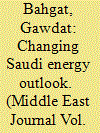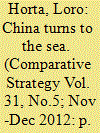| Srl | Item |
| 1 |
ID:
124751


|
|
|
|
|
| Publication |
2013.
|
| Summary/Abstract |
For a long time the conventional wisdom in Middle Eastern Studies has been that oil and regional security constituted the basis of relations between the United States and Saudi Arabia. Riyadh would ensure adequate supplies at reasonable prices, and in return, Washington would guarantee the Kingdom's security against regional threats. In recent years, the two nations' energy landscapes have changed dramatically. The United States is projected to become less dependent on foreign energy sources, while Saudi Arabia has allocated substantial resources to diversify its energy mix, utilize alternative energy, and reduce consumption. This article examines the recent Saudi efforts to develop nuclear power and renewable resources; and also provides a preliminary assessment of potential strategic implications of these efforts for US-Saudi relations.
|
|
|
|
|
|
|
|
|
|
|
|
|
|
|
|
| 2 |
ID:
116347


|
|
|
|
|
| Publication |
2012.
|
| Summary/Abstract |
As China's economy continues to expand, its policies and interests change and evolve. Today, Chinese economic and political interests span the globe from Africa to Latin America and the South Pacific. The country has grown more dependent on foreign energy sources in once marginal places such as Angola. Access to resources such as oil and natural gas are now at the forefront of Chinese security policy. While access to markets and regions where massive Chinese investment is occurring is equally important, these new challenges have led to some important changes in China's security and military posture, particularly its naval strategy. While diplomacy and economic power are still the most practical alternatives available to China to defend its interests, several Chinese military and civilian observers now openly discuss other alternatives, such as the eventuality of using military power to defend these interests. This is particularly visible in the People's Liberation Army Navy, where a more ambitious and confident maritime strategy is now being discussed.
|
|
|
|
|
|
|
|
|
|
|
|
|
|
|
|